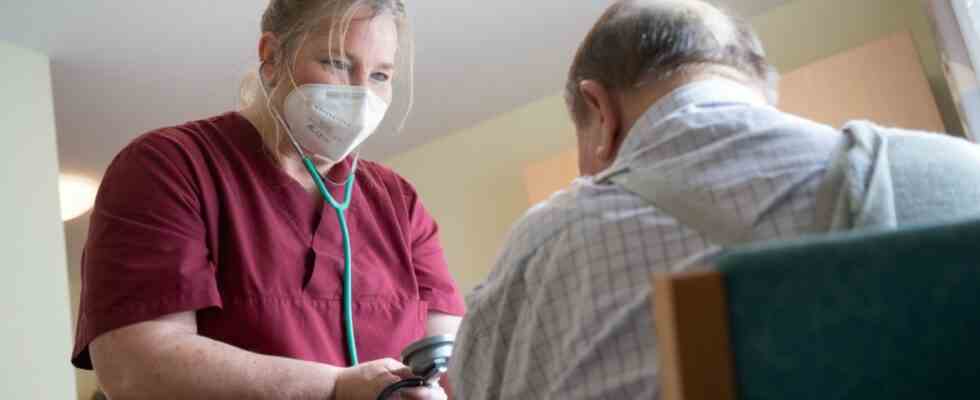Health Minister Klaus Holetschek did not skimp on drama on Tuesday. Around 580,000 people in need of care are currently living in Bavaria. It is likely to be one million by 2050. “Where will the people standing by the bed come from in the future?” asked the minister. Care could become the “question of fate” for an entire generation, “if we don’t set the course now”.
But of course the state government wants to act. The working conditions for domestic nurses will be improved. The minister promised at the press conference that anyone who wants to work as a nurse as a foreigner in Bavaria should be recognized more quickly in the future. The cabinet under Prime Minister Markus Söder (CSU) had previously discussed the issue of care. The Free State will also continue to promote the creation of new care places, said Holetschek. 4,000 new or converted care places have already been created with state aid, and there should be 8,000 in the future.
More foster homes are urgently needed. However, this is not the first time the state government has promised them. Within five years there will be a guaranteed care place in Bavaria for everyone in need of care from care grade II, announced the newly appointed Prime Minister Söder in 2018. “In this way we give people security who are wondering who will take care of them once home care is no longer possible,” said Söder at the time. A promise that the opposition likes to remind him of. “Söder has dropped the legal claim, just like the people who were hoping for it,” said SPD member of parliament and health expert Ruth Waldmann.
Minister Holetschek reacted evasively to the question of what had become of the legal entitlement. “The goal is still that everyone in need of care should get a place,” he said. Attempts are now also being made to promote care at home and with the help of district nurses and volunteers. People who wanted this could then also be cared for at home.
The minister also knows that new nursing home places will not exist without new nurses. At the moment, however, homes and clinics are hardly able to fill the existing staffing gaps. Perhaps that is why the announced care package is primarily aimed at the staff. It should be relieved, psychologically better looked after and freed from tiresome bureaucracy, as the Minister of Health announced.
Specifically, Bavaria wants to spend 7.5 million euros to set up so-called jumper pools. Nurses should be employed in these pools, who can be deployed spontaneously where others have fallen ill. As a result, there could be fewer short-term roster changes in the homes, so the idea. These are often perceived as stressful by the employees and are also one of the reasons why it is so difficult to reconcile work in care with family life.
Health insurance companies would have to cover the costs for jumpers
The pools will initially only be tested as model projects at 30 facilities. In the long term, however, they should become part of standard care. The health insurance companies would then have to cover the costs. It was an emergency measure, criticized SPD member of parliament Waldmann. Springer pools could cushion bottlenecks, but this does not gain a single additional nurse. The jumpers are also not firmly involved in the everyday life of the stations. From the point of view of the sick people, however, this is desirable.
Waldmann, on the other hand, called the state government’s plans to speed up the recognition procedures for foreign nurses overdue and important. The SPD had demanded this for a long time. Foreign nurses must provide detailed evidence of the individual steps of their training. Depending on the routine of the competent recognition authority, it could take a year and a half before everything is checked. In the future, all recognition procedures for carers will be processed centrally at the State Office for Care.
Also to relieve the nursing staff, more psychological help is to be offered in the future. “We want contact points for psychosocial counseling in every administrative district,” said Holetschek. The care provided by nurses could also help to reduce the high level of sick leave in this occupational group. Employees in geriatric care were reported sick for an average of around 33 days in 2022. The average of all employees was around 18 days. “A nationwide, broad and low-threshold range of psychosocial support should be just as natural for caregivers as it is for firefighters, for example,” said the President of the Association of Nurses in Bavaria, Georg Sigl-Lehner.

